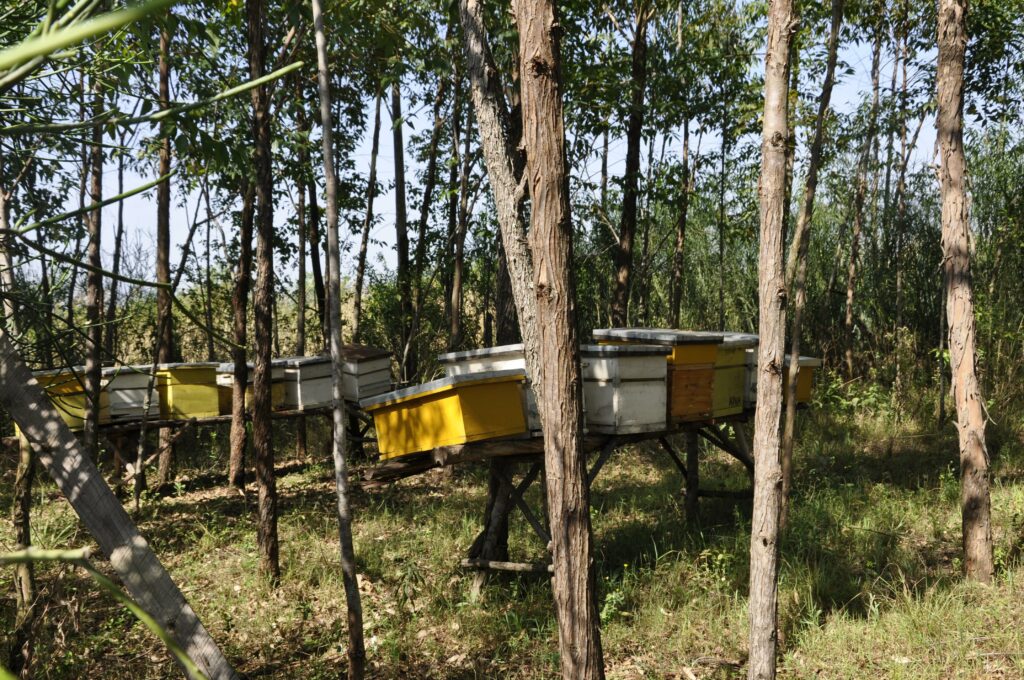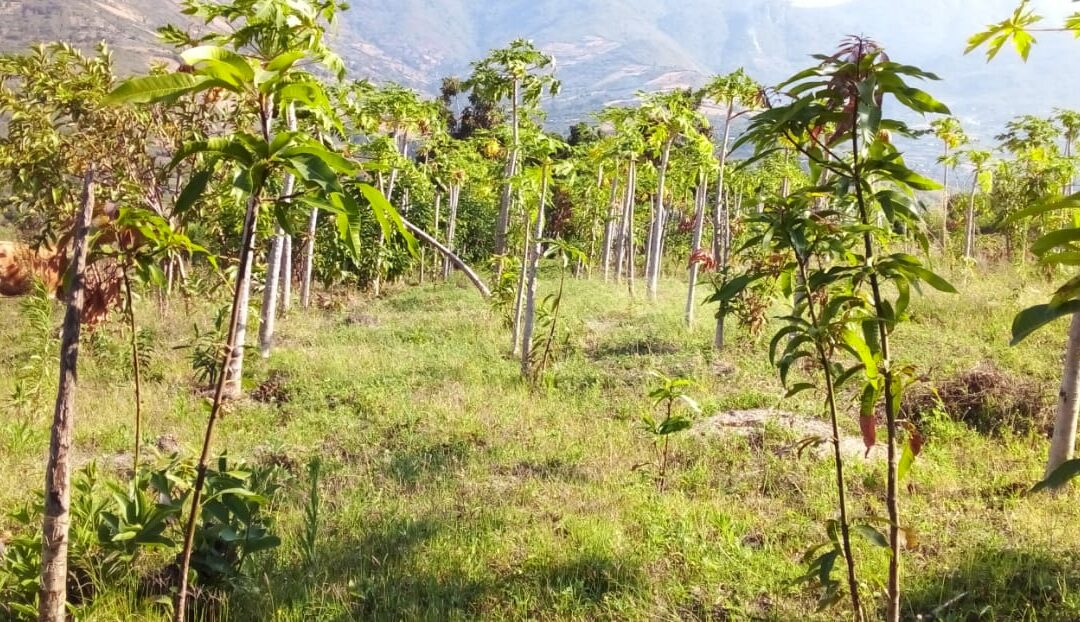By Grace Koech
Farmers and researchers are exploring ways to add value to farmer-managed natural regeneration plots in Kenya, chiefly by incorporating apiculture into these systems to offer additional livelihood options and make the most of the bee forage that the trees provide.
Pastor Ken Ouma’s farm in Kenya’s Homabay County is a true reflection of diversity. On his five-acre plot, he’s growing five timber tree species – siala [Markhermia lutea], kang’o [Olea Africa], sangla [Rhus Vulgaris], ogongo [Acacia polyacantha] and ochol [Euclea divinorum] – alongside banana, pawpaw, and mango. Within his tree plots, which are now four years old, Ouma incorporates food crops such as maize, millet, and beans; he also grows vegetables elsewhere on the farm. Now, he’s motivated and empowered to add yet another string to his bow: beekeeping.
Ouma is a beneficiary of an EU-funded Regreening Africa project, which is supporting farmer-managed natural regeneration (FMNR) in the area. FMNR is a low-cost land restoration technique that is being used in many developing countries to combat poverty and hunger among subsistence farmers, while building resilience to climate change. Using this technique, farmers regenerate and manage trees and shrubs from tree stumps, roots, and seeds.
Now, scientists at the Center for International Forestry Research-World Agroforestry (CIFOR-ICRAF) and partners are working alongside farmers like Ouma to explore how to add more value to established FMNR plots in the project area. Diversifying these plots is a continuous process; early on in the project, this was done by adding enrichment planting, fruit tree farming, and tree nurseries to increase density and diversity; expand food systems, and grow environmental resilience to climate change and other shocks.
The FMNR plots include several species that could also support fodder production for livestock such as cattle, sheep, and bees. Beekeeping was identified as being of particular interest in the project baseline study, so participants and experts have now begun to explore incorporating apiculture into their systems. A training workshop was delivered to 26 trainees drawn from groups working on FMNR, tree growers, nursery operators, and bee farmers in the Suba and Mbita sub-counties within Homabay County. It was co-facilitated by the Ministry of Agriculture Homabay County, World Vision Kenya, and CIFOR-ICRAF, and involved classroom sessions and demonstrations.
 Beehives on an FMNR farm. Photo: World Vision Kenya
Beehives on an FMNR farm. Photo: World Vision Kenya
The course built the capacity of farmers in the selection of suitable sites for establishing apiaries; understanding bee biology to improve cultivation of bee forage; and supplemental feeding and hive management. For existing bee farmers, further capacity-building was provided on harvesting skills and value addition for bee products.
Many participants were elated to learn that the tree diversity within their farms could support the provision of bee forage and provide material for the construction of beehives. Pruning from indigenous trees, they learned, could be used as stands for top-bar hives or for building apiaries to hold box hives; gum-producing trees offered propolis for sealing openings within the beehives, and twigs from forage plants could be used in the smoker during the harvest of bee products.
“Incorporating bee farming with FMNR and tree growing interventions is a lever for sustainable tree management, as farmers are more likely to maintain their trees due to the additional food and income benefits generated from synergistic interventions,” said ICRAF research scientist, and Regreening Africa’s Design, Techniques, and Implementation Lead, Sammy Carsan.
The next steps in this project will be to support existing bee farms; revive old ones; and establish new ones using the skills acquired. To achieve this, community sensitization will be needed on the importance of integrating apiculture within FMNR plots. Partnership with the county government will also be critical to creating linkages with other stakeholders working on bee farming. Farm monitoring and technical backstopping will be required to ensure that smallholders can realise and receive the potential environmental, social, medicinal, and economic benefits from their established plots.
“Beekeeping, like other enterprises, has a social dimension that governs it and ensures its functionality,” said Regreening Africa Programme Manager Mieke Bourne. “Encouraging stakeholder participation at all levels within the value chains not only sustains but also ensures the profitability and scalability of the enterprises.”
This story was produced with the financial support of the European Union. Its contents are the sole responsibility of Regreening Africa and do not necessarily reflect the views of the European Union.

